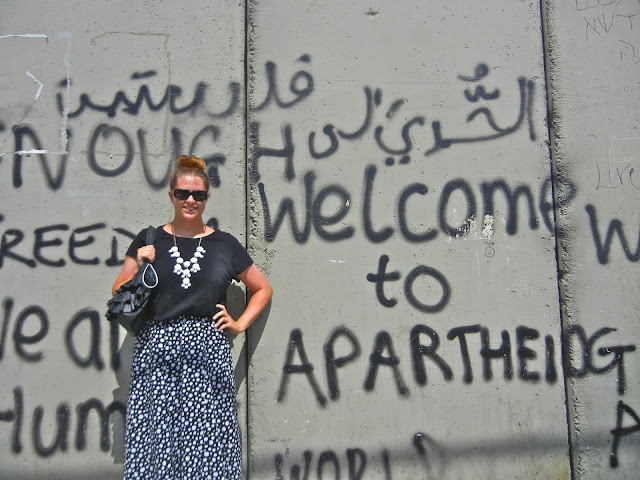The Wall
A few weeks ago we went on a short field trip to see the Separation Wall and to learn more about it.
The Israelis started building it during the Second Intifada- an uprising between 2000-2005 when there was lots of terrorism. That’s why the BYU Jerusalem Center was closed from 2000-2005.
To control the security situation better, Israel started building a physical barrier- the wall- to separate Israelis and Palestinians. It divides Israel and the West Bank. To get to the other side, you have to go through a military checkpoint. It’s still being built, and it’s not done yet.
There were other factors involved as well, but it helped terrorism basically come to an end. Now it’s safe enough for me to be here!
Between 2000-2003, 73 suicide bombing attacks killed 293 people and injured 1,900. The first segment of the wall was built in 2003. Between 2003-2006, only 12 attacks were carried out. Since 2006, there have only been 3 bombings. And none since 2008!
The 'controversy' associated with the wall is that it restricts the freedom of movement of Palestinians. In some cases, the wall separates Palestinians from each other and makes it very inconvenient to see family and friends, or prevents children from attending schools that are a lot closer to home. Sometimes people accuse Israelis of purposely building the wall to give themselves more land, and intentionally taking land away from people that has been in their family for generations.
From what I understand, Israel always intended this to be a temporary solution. It was a desperate attempt to stop terrorism. It's unfortunate that it negatively affects the lives of innocent people, but there are consequences to rampant terrorism.
I believe that everyone has a right to not live in fear. The death toll during the Second Intifada was about 1,000 Israelis. Israel has a population of about 7 million. Think how big of an effect that would have on the U.S. if percentage-wise that many people died in terrorist attacks.
To get an idea of how Palestinians feel about the wall, check out some of the graffiti. Pretty interesting. There are comparisons to Nazi ghettos and South African apartheid, which in my opinion is pretty stupid and offensive to actual victims of genocide and apartheid.
About 20% of Israel's citizens today are Arab, and they enjoy full and equal legal rights, not to mention the most stable democracy and strongest economy in the Middle East. There are Arab doctors, professors, parliament members and supreme court justices. Doesn't sound like apartheid to me.
The Palestinian population has a healthy population growth rate. Doesn't sound like genocide to me. Meanwhile, the Jewish population is STILL recovering from the Holocaust 80 years later.
I'd also like to note that Palestinians do not allow any Jews in "their" territory but expect freedom of movement in all Jewish areas. Make it make sense.
All of the graffiti is in English. If it was in Arabic, only people who probably already agree with them would be able to understand it.
All of the graffiti is in English. If it was in Arabic, only people who probably already agree with them would be able to understand it.
Anyways, it's a pretty depressing place to visit. But yet, I still posed for a picture.
I'm enjoying the chance to learn more about modern Israel in addition to biblical Israel.







I'm glad that it's relatively safe for people to visit Israel now. So glad you have been able to have this life-changing experience of studying at the BYU Jerusalem Center. What an amazing experience!! Sure, the wall is not an IDEAL solution, but if it's stopping terrorist bombings, then it's saving innocent lives.
ReplyDelete